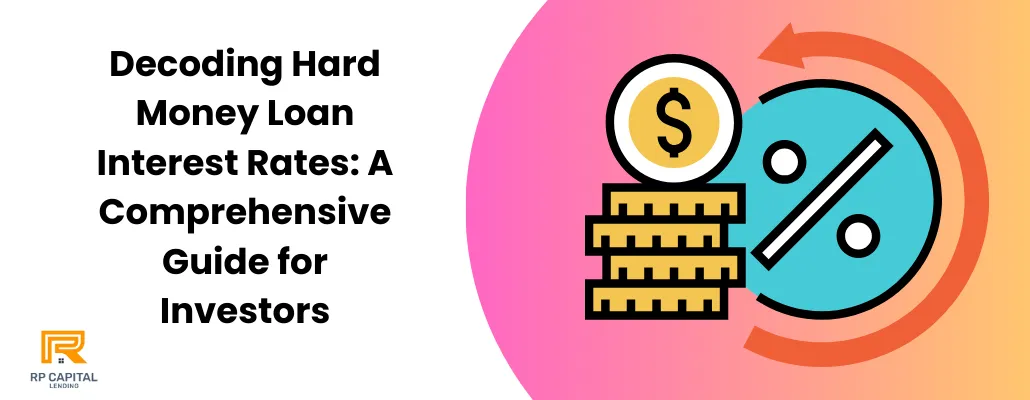Blog

Decoding Hard Money Loan Interest Rates: A Comprehensive Guide for Investors
In the fast-paced world of real estate investing, timing is everything. When conventional loans can't keep up with your needs, hard money loans can be a lifeline.
However, these loans come with a price—higher interest rates. Understanding what drives these rates and how to negotiate them is essential for making smart investment decisions.
Let's take a closer look at the nuances of hard money loan interest rates.
What Are Hard Money Loans?

Hard money loans are short-term, asset-based loans typically used by real estate investors. Unlike traditional loans, which are based on the borrower’s creditworthiness, hard money loans are primarily secured by the value of the property being purchased or used as collateral. This type of loan is often sought when borrowers need quick access to funds, either because they are unable to obtain traditional financing or because the timing is critical for their investment.
What Are Hard Money Loan Interest Rates?
Hard money loans are short-term, asset-based loans typically used by real estate investors who need quick financing. Unlike traditional loans, which are based on the borrower's creditworthiness, hard money loans are primarily based on the value of the property being used as collateral. Because of the higher risk to the lender, the interest rates on these loans are significantly higher, often ranging between 8% and 15%. In some cases, especially for riskier projects or less desirable properties, rates can even exceed 15%.
In-Depth Analysis: Factors Influencing Hard Money Loan Interest Rates

Understanding the factors that influence hard money loan interest rates is crucial for investors who want to manage their borrowing costs effectively.
1. Risk Assessment
Property Type and Condition: The type and condition of the property being financed play a significant role in determining the interest rate. For example, a well-maintained residential property in a desirable area is less risky and may secure a lower rate compared to a commercial property in a less stable market.
Project Scope: The complexity of the project also impacts the rate. A simple fix-and-flip might attract a lower interest rate compared to a large-scale property development, which carries higher risks.
2. Loan-to-Value (LTV) Ratio
The LTV ratio is a critical factor in determining the interest rate. Lenders prefer a lower LTV ratio because it means the borrower has more equity in the property, reducing the lender's risk. For example, a loan with a 60% LTV might have a lower interest rate than a loan with an 80% LTV.
3. Borrower's Creditworthiness
While hard money lenders focus primarily on the property, a borrower’s credit score and financial history are not entirely disregarded. Borrowers with higher credit scores may have some leverage to negotiate slightly lower interest rates. However, this influence is less pronounced than with conventional loans.
4. Market Conditions
Interest rates for hard money loans are also influenced by broader economic conditions, including the real estate market, inflation rates, and the availability of capital. In a booming real estate market, demand for hard money loans may drive up interest rates, while in a downturn, rates might stabilize or decrease slightly.
5. Loan Term and Duration
The typical duration for a hard money loan is between 6 to 24 months. Shorter loan terms generally carry higher interest rates because lenders expect a quicker return on their investment. Conversely, slightly longer terms might offer marginally lower rates, but this is less common.
Why Hard Money Loan Interest Rates Are Higher?
The elevated interest rates associated with hard money loans reflect the higher risks that lenders take on. Unlike conventional loans that undergo rigorous underwriting processes, hard money loans are expedited to meet the immediate needs of investors. This speed and flexibility come at a premium.
Moreover, since these loans are often used for properties or situations that traditional lenders deem too risky—such as distressed properties or borrowers with poor credit—lenders charge higher rates to compensate for the increased likelihood of default. The emphasis on the property as collateral also means that lenders must ensure that they are adequately compensated in the event of a foreclosure.
Strategies to Minimize Hard Money Loan Interest Rates

Investors can take several steps to minimize the interest rates on hard money loans:
1. Comparison Shopping
Just like with any financial product, it pays to shop around. Different hard money lenders offer varying interest rates and terms. By obtaining quotes from multiple lenders, you can compare and choose the one that offers the best deal for your specific project.
2. Improve Credit Profile
Although credit is not the primary consideration, demonstrating financial responsibility through a good credit score can help you negotiate better terms. Paying off existing debts and ensuring a clean credit history can make you a more attractive borrower.
3. Offer a Higher Down Payment
By offering a higher down payment, you can lower the LTV ratio, which in turn might reduce the interest rate. This shows the lender that you have more skin in the game, thereby reducing their risk.
4. Leverage Strong Collateral
The quality and value of the collateral play a significant role in the interest rate. If you’re using a property in a high-demand area as collateral, this can help you secure a lower rate. Properties that are easy to sell in case of default are considered less risky.
5. Negotiate Terms Based on Loan Duration
If your project timeline allows, negotiating a slightly longer loan term could help in securing a lower interest rate. However, be cautious of potential prepayment penalties if you repay the loan earlier than agreed.
FAQs About Hard Money Loan Interest Rates
1. Why are hard money loan interest rates higher than traditional loans?
Hard money loan interest rates are higher because these loans are riskier for lenders, who rely more on the property’s value than on the borrower’s creditworthiness. The higher rates compensate for this increased risk.
2. Can I negotiate the interest rate on a hard money loan?
Yes, you can negotiate interest rates by improving your credit score, offering a larger down payment, or securing the loan with high-quality collateral. Shopping around among different lenders also helps.
3. Are hard money loan interest rates fixed or variable?
Most hard money loans have fixed interest rates, meaning the rate will not change throughout the loan term. However, it's essential to confirm this with your lender, as terms can vary.
4. How long are hard money loan terms typically?
Hard money loan terms typically range from 6 months to 2 years. These short-term loans are designed to provide quick financing, often for real estate investments, with the expectation of rapid repayment.
5. What happens if I default on a hard money loan?
If you default on a hard money loan, the lender can seize the collateral—usually the property securing the loan. Because of this, it’s crucial to ensure that you have a clear repayment plan before taking out such a loan.
Conclusion
Hard money loans serve as a valuable tool for real estate investors who need quick access to capital. However, understanding the interest rates and how they are determined is crucial for managing costs effectively. By considering the key factors that influence these rates and employing strategies to minimize them, you can make informed decisions that align with your investment goals.
In a world where time is money, hard money loans offer the speed and flexibility needed to seize investment opportunities. But with these advantages come higher costs. By being well-informed, you can navigate the hard money loan landscape with confidence, securing the best possible rates for your next big project.
RP Capital Lending is a d.b.a of RP Capital Partners Inc (NMLS # 2469193) | Privacy Policy
Copyright © 2022. All Rights Reserved.
Disclaimer: Loans only apply to non-owner occupied properties. Rates, terms and conditions offered only to qualified borrowers, may vary upon loan product, deal structure, other applicable considerations, and are subject to change at any time without notice.

